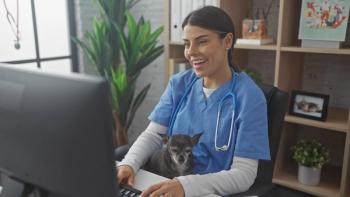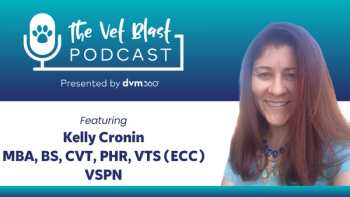
Fingerprints: Dr. Colin Burrows
What youd ask and what youd never think to ask a leading voice of veterinary medicine.
You could argue that Colin Burrows, BVetMed, PhD, DACVIM, HonFRCVS, has had a larger impact on veterinary medicine than anyone alive. A talented veterinarian, researcher and teacher, Burrows' greatest gift to our profession was having the passion and plan to create the North American Veterinary Conference (NAVC) in Orlando. Ill suited to resting on his laurels (or resting at all for that matter) Burrows has welcomed other educators and conferences under his wing to raise the quantity and quality of veterinary continuing education worldwide.
Where were you born and raised?
I was born in Colchester, England, which has the distinction of being Britain's oldest recorded town. I grew up in the nearby village of Dedham, which is well known because the artist John Constable placed the church tower in many of his paintings of the locality.
What was your first job?
My first job was delivering newspapers in the mornings before school when I was 8-years-old. It was a country route on my mother's old bike in rain, snow or shine. The best pre-professional job was as a water bailiff for the local fishing club, I checked licenses and kept things tidy but basically I got paid to go fishing!
Burrows with his Jack Russell Terrier “Buster” outside the department office at UF CVM.
When did you first know you wanted to be a veterinarian?
I was 8-years-old and had a pet bantam chicken that stopped eating. Without telling my parents I took the bird in a bag on my bike to the veterinarian in the next village. He told me she had a stuffed crop and operated while I paced the garden. He didn't charge me, and the bird recovered. I thought that was pretty cool.
The best part about being a veterinarian is?
My students and the friends I have made in many countries over the years and still being able to help animals through veterinary continuing education, firstly as a teacher, then as a meeting planner and now through my role with the World Small Animal Veterinary Association (WSAVA).
Here Burrows is at WSAVA Congress in 2006 in Prague, Czech Republic, giving lecture after winning an award for service to the profession.
Tell us about a patient that shouldn't have lived but did.
It was a German shorthaired pointer that had been involved in an explosion in a local dry cleaning store. The owner was cleaning hats with naphtha and lit a cigarette. I was running the ICU at the University of Pennsylvania at the time and this was my first ever burn patient. I learned a lot about supportive care and the pathophysiology of burns.
Medicine or surgery?
Medicine.
Practice or management?
Practice.
What is your perfect idea of happiness?
A good day's fishing-fighting at least one Tarpon during the day.
What is your greatest fear?
This is not an easy one. A phrase that springs to mind is from John Keats sonnet: “When I have fears that I may cease to be.” There is still so much to do.
Who is your hero in real life?
Margaret Thatcher who turned Britain around and ranks as one of the greatest leaders of modern times.
What do you collect?
Plants, much to my wife's chagrin. She says I am a plant hoarder!
Who or what is the greatest love of your life?
My family on a personal level, and it's a toss up between gardening and fishing in the other.
Although he prefers to fish in the ocean Burrows is always happy to have time to fish. This bass was caught and returned in a lake in central Florida.
What's your favorite childhood food that you still love today?
Roast pheasant with bread sauce, roast potatoes, Yorkshire pudding and fresh garden peas. Christmas pudding is a close second.
What food(s) do you detest?
This is the easiest question-liver and kidneys.
Tell us about your first pet?
The bantam named above. She was called “Gas Stove” because the egg was incubated in a cotton wool-lined saucepan on a gas stove by my sisters in-laws. She was hand reared and we had an instant bond.
If you could wave a magic wand and change one thing about veterinary medicine that would help pets, people and the profession what would you do?
I would make rabies vaccination compulsory for every dog in the world. Rabies kills at least 55,000 people each year in Africa and India alone mainly through rabid dog bites. Rotary International makes a big fuss about eliminating polio but rabies is the shunned disease because it affects the mostly poor and helpless. The WSAVA is working with other associations to eliminate the disease by 2030, but it is a long and difficult road.
What are you going to do when you retire?
I am already retired and as busy as ever. The one thing I do now is to volunteer as a master gardener, which I really enjoy. It is a license to learn a new art and science. I took a course in therapeutic horticulture and volunteer with patients in the greenhouse at UF Health Shands hospital here at the University of Florida. It is so rewarding to teach people the delights of basic gardening and to see how much they get out of it. It is so different from my other life but it is a few hours I cherish every week.
When and where are you the happiest?
Either in my garden, or when I have the rare opportunity to fish in the Florida Keys with my best friend Mark.
What do you consider your greatest achievement?
Scientifically, perhaps being the first to document and describe Hemorrhagic gastroenteritis in dogs; personally, to have led the North American Veterinary Conference from its first meeting in 1984 with 600 registrants to where it is today. It was also a great honor to have the NAVC/WSAVA International Scholarship program named after me at the recent NAVC Conference.
What's one thing you do every single year without fail?
Plant sugar snap peas in my garden on New Year's Day.
Tell us about a view or vista that took your breath away and left an indelible imprint in your mind?
The sight of the Eiffel Tower on my first visit to Paris in 1989 and last year, on safari in South Africa, when a female leopard and her cub were so close I could have reached out and touched them. It brought tears to my eyes. It was beautiful moment.
Would you encourage your child to become a veterinarian? Why or why not?
I always left that opportunity open to my two children. They chose different career paths. My son is an engineer in the automotive industry and my daughter is a marine biologist finishing a PhD at Duke University. She is studying the feeding habits of humpback whales. I am proud of both my children and their accomplishments.
Describe a perfect day as a veterinarian?
In rounds with my students, endoscopically removing an intestinal foreign body from a cat and getting good results from a study in my lab.
Here Burrows is hosting the 2014 president's reception in Cape Town, South Africa. Pictured with his successor as department chair at UF, Dr. Rowan Milner.
For the veterinary profession to thrive and not just survive we must?
Get smarter about business and somehow stop the over production of veterinarians. I have difficulty accepting the recent burgeoning of new “trade schools” with no requirement by the licensing body that they add to the body of knowledge. I believe that it is the incumbent responsibility of any veterinary school faculty that they add to the body of knowledge, not just repeat it to their students.
Veterinary Economics Practice Leadership Editor Dr. Marty Becker is a renowned speaker, TV personality and author of The Healing Power of Pets: Harnessing the Amazing Ability of Pets to Make and Keep People Happy and Healthy. Dr. Becker practices at North Idaho Animal Hospital in Sandpoint, Idaho.
Newsletter
From exam room tips to practice management insights, get trusted veterinary news delivered straight to your inbox—subscribe to dvm360.





